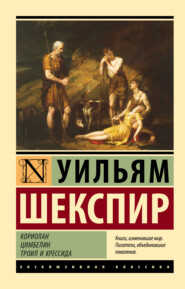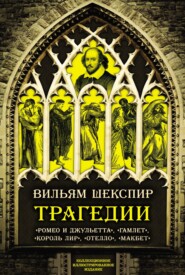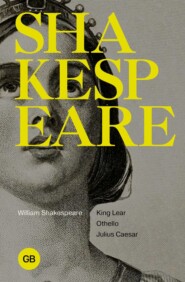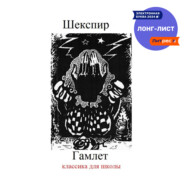По всем вопросам обращайтесь на: info@litportal.ru
(©) 2003-2025.
✖
The First Part of King Henry the Fourth
Настройки чтения
Размер шрифта
Высота строк
Поля
Envy your great deservings and good name,
Because you are not of our quality,
But stand against us like an enemy.
Blunt. And God defend but still I should stand so,
So long as out of limit and true rule
You stand against anointed majesty!
But to my charge. The King hath sent to know
The nature of your griefs; and whereupon
You conjure from the breast of civil peace
Such bold hostility, teaching his duteous land
Audacious cruelty. If that the King
Have any way your good deserts forgot,
Which he confesseth to be manifold,
He bids you name your griefs, and with all speed
You shall have your desires with interest,
And pardon absolute for yourself and these
Herein misled by your suggestion.
Hot. The King is kind; and well we know the King
Knows at what time to promise, when to pay.
My father and my uncle and myself
Did give him that same royalty he wears;
And when he was not six-and-twenty strong,
Sick in the world's regard, wretched and low,
A poor unminded outlaw sneaking home,
My father gave him welcome to the shore;
And when he heard him swear and vow to God
He came but to be Duke of Lancaster,
To sue his livery and beg his peace,
With tears of innocency and terms of zeal,
My father, in kind heart and pity mov'd,
Swore him assistance, and performed it too.
Now, when the lords and barons of the realm
Perceiv'd Northumberland did lean to him,
The more and less came in with cap and knee;
Met him on boroughs, cities, villages,
Attended him on bridges, stood in lanes,
Laid gifts before him, proffer'd him their oaths,
Give him their heirs as pages, followed him
Even at the heels in golden multitudes.
He presently, as greatness knows itself,
Steps me a little higher than his vow
Made to my father, while his blood was poor,
Upon the naked shore at Ravenspurgh;
And now, forsooth, takes on him to reform
Some certain edicts and some strait decrees
That lie too heavy on the commonwealth;
Cries out upon abuses, seems to weep
Over his country's wrongs; and by this face,
This seeming brow of justice, did he win
The hearts of all that he did angle for;
Proceeded further- cut me off the heads
Of all the favourites that the absent King
In deputation left behind him here
When he was personal in the Irish war.
But. Tut! I came not to hear this.
Hot. Then to the point.
In short time after lie depos'd the King;
Soon after that depriv'd him of his life;
And in the neck of that task'd the whole state;
To make that worse, suff'red his kinsman March
(Who is, if every owner were well placid,
Indeed his king) to be engag'd in Wales,
There without ransom to lie forfeited;
Disgrac'd me in my happy victories,
Sought to entrap me by intelligence;
Rated mine uncle from the Council board;
In rage dismiss'd my father from the court;
Broke an oath on oath, committed wrong on wrong;
And in conclusion drove us to seek out
This head of safety, and withal to pry
Into his title, the which we find
Too indirect for long continuance.
Blunt. Shall I return this answer to the King?
Hot. Not so, Sir Walter. We'll withdraw awhile.
Go to the King; and let there be impawn'd
Some surety for a safe return again,
And In the morning early shall mine uncle
Bring him our purposes; and so farewell.
Blunt. I would you would accept of grace and love.
Hot. And may be so we shall.
Blunt. Pray God you do.
Exeunt
Scene IV. York. The Archbishop's Palace
Enter the Archbishop of York and Sir Michael.
Arch. Hie, good Sir Michael; bear this sealed brief
With winged haste to the Lord Marshal;
This to my cousin Scroop; and all the rest
To whom they are directed. If you knew
How much they do import, you would make haste.
Sir M. My good lord,
I guess their tenour.
Arch. Like enough you do.
To-morrow, good Sir Michael, is a day
Wherein the fortune of ten thousand men
Must bide the touch; for, sir, at Shrewsbury,
As I am truly given to understand,
Because you are not of our quality,
But stand against us like an enemy.
Blunt. And God defend but still I should stand so,
So long as out of limit and true rule
You stand against anointed majesty!
But to my charge. The King hath sent to know
The nature of your griefs; and whereupon
You conjure from the breast of civil peace
Such bold hostility, teaching his duteous land
Audacious cruelty. If that the King
Have any way your good deserts forgot,
Which he confesseth to be manifold,
He bids you name your griefs, and with all speed
You shall have your desires with interest,
And pardon absolute for yourself and these
Herein misled by your suggestion.
Hot. The King is kind; and well we know the King
Knows at what time to promise, when to pay.
My father and my uncle and myself
Did give him that same royalty he wears;
And when he was not six-and-twenty strong,
Sick in the world's regard, wretched and low,
A poor unminded outlaw sneaking home,
My father gave him welcome to the shore;
And when he heard him swear and vow to God
He came but to be Duke of Lancaster,
To sue his livery and beg his peace,
With tears of innocency and terms of zeal,
My father, in kind heart and pity mov'd,
Swore him assistance, and performed it too.
Now, when the lords and barons of the realm
Perceiv'd Northumberland did lean to him,
The more and less came in with cap and knee;
Met him on boroughs, cities, villages,
Attended him on bridges, stood in lanes,
Laid gifts before him, proffer'd him their oaths,
Give him their heirs as pages, followed him
Even at the heels in golden multitudes.
He presently, as greatness knows itself,
Steps me a little higher than his vow
Made to my father, while his blood was poor,
Upon the naked shore at Ravenspurgh;
And now, forsooth, takes on him to reform
Some certain edicts and some strait decrees
That lie too heavy on the commonwealth;
Cries out upon abuses, seems to weep
Over his country's wrongs; and by this face,
This seeming brow of justice, did he win
The hearts of all that he did angle for;
Proceeded further- cut me off the heads
Of all the favourites that the absent King
In deputation left behind him here
When he was personal in the Irish war.
But. Tut! I came not to hear this.
Hot. Then to the point.
In short time after lie depos'd the King;
Soon after that depriv'd him of his life;
And in the neck of that task'd the whole state;
To make that worse, suff'red his kinsman March
(Who is, if every owner were well placid,
Indeed his king) to be engag'd in Wales,
There without ransom to lie forfeited;
Disgrac'd me in my happy victories,
Sought to entrap me by intelligence;
Rated mine uncle from the Council board;
In rage dismiss'd my father from the court;
Broke an oath on oath, committed wrong on wrong;
And in conclusion drove us to seek out
This head of safety, and withal to pry
Into his title, the which we find
Too indirect for long continuance.
Blunt. Shall I return this answer to the King?
Hot. Not so, Sir Walter. We'll withdraw awhile.
Go to the King; and let there be impawn'd
Some surety for a safe return again,
And In the morning early shall mine uncle
Bring him our purposes; and so farewell.
Blunt. I would you would accept of grace and love.
Hot. And may be so we shall.
Blunt. Pray God you do.
Exeunt
Scene IV. York. The Archbishop's Palace
Enter the Archbishop of York and Sir Michael.
Arch. Hie, good Sir Michael; bear this sealed brief
With winged haste to the Lord Marshal;
This to my cousin Scroop; and all the rest
To whom they are directed. If you knew
How much they do import, you would make haste.
Sir M. My good lord,
I guess their tenour.
Arch. Like enough you do.
To-morrow, good Sir Michael, is a day
Wherein the fortune of ten thousand men
Must bide the touch; for, sir, at Shrewsbury,
As I am truly given to understand,

















